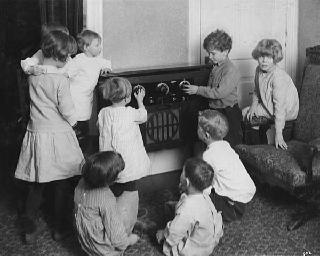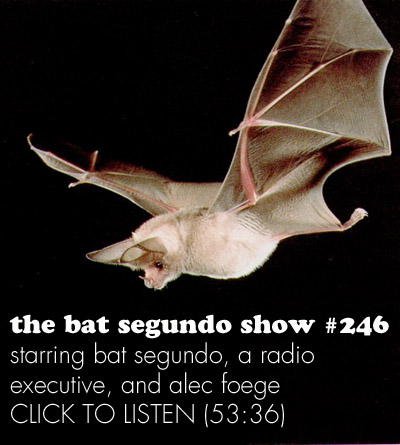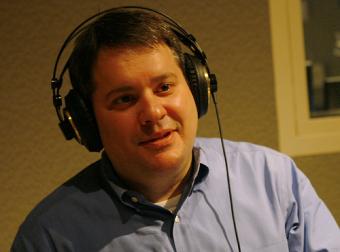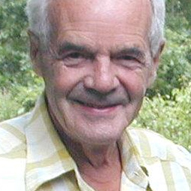Moorish Girl posts to this item from Turbanhead. Apparently, the wakeup crew at Philadelphia’s Power 99 radio think that it’s absolutely hilarious to call a customer service line outsourced to India and berate an employee with sexist and racist banter.
The MP3 has been removed from the Power 99 site, but, in the event that Turbanhead‘s servers get overloaded on this, I’ve mirrored the file here and I urge anyone who cares to host the file too. For those who can’t play audio at work, here’s a transcript:
NARRATOR INTRO: Wakeup with Star and Buc Wild in the mornings of Power 99 FM.
STAR: I’m going to play this call from earlier before we get out of here. This is the, uh, call that I made to — I thought it was a company here locally. Not that I was surprised.
(laughter)
STAR: I saw this infomercial about, uh, what are these things called again? Oh, the, uh…
FEMALE VOICE: Bead? Oh shoot.
STAR: Anyway, let — let’s just play the call. I was surprised when I got somebody on the line in East India. These little beads that I saw. Little white kids, uh, a little machine that puts them in their hair.
FEMALE VOICE: Mm’hm.
STAR: Play it.
(tape begins)
STEENA: This is Steena. How may I help you?
STAR: Hi, Stain-a, you say?
STEENA: Yes.
STAR: (in fake Indian accent) Yeah, I called and I just got hung up on. I’m calling from America about the quick beads for my daughter’s, uh, hair. Quick beads.
STEEA: Okay. May I have your ZIP code please?
STAR: 10274.
STEENA: 10274?
STAR: Yes. Get it right. Now are you in India? Because I just spoke to someone in India who hung up on me.
STEENA: Thank you. I am from India, ma’am.
STAR: Okay. So my call is being outsourced to India.
STEENA: That’s right.
STAR: In… in regards to my six year old, white American daughter who wants to get the quick beads like Serena and Venus Williams.
STEENA: Now. I’ll definitely place an order for that. See…
STAR: What’s that?
STEENA: …in the ad, she called to place a quick bead of counier. To ensure proper handling…
STAR: Ma’am, I don’t know what the hell you’re saying. Hang on a second. Let me try and get something straight here. The quick beads, like Venus and Serena Williams, that to advertise to — to the white kids on television. This call has been outsourced to India?
STEENA: That’s right.
STAR: Well, ma’am, what the eff would you know about an American white girl’s — uh, uh — hair? And quick beads.
STEENA: Just to inform you, ma’am, we’re a national chain services company. And we’re just taking calls on the opposite…
STAR: Listen, bitch! Don’t get slick with the mouth! Don’t you get slick with me, bitch!
STEENA: Now if you continue to speak this language, I will disconnect the call.
STAR: Listen to me, you dirty rat eater. I’ll come out there and choke the eff out of you.
(laughter)
STAR: You’re a filthy rat eater. I’m calling about my American six year old white girl. How dare you outsource my call? Get off the line, bitch!
(laughter; end of tape)
STAR: Pull it up.
(laughter)
STAR: Heard they listen well out there.
* * *
The call letters of Power 99 are WUSL. It shouldn’t be too much of a surprise to learn that the station is owned by Clear Channel. In light of the station’s Stop the Violence and Increase the Peace campaign, it might be worth addressing this verbal violence to the WUSL manager and to Clear Channel Corporate. Letters written on actual paper or faxes are the best way to deal with this. Emails can be overlooked, but paper is a physical presence. You can find addresses and fax numbers right here:
Power99 WUSL-FM
440 Domino Lane
Philadelphia, PA 19128
General Business Line: 215-483-8900
Fax: 215-483-5930
Director of Urban Programming/Program Director: Thea Mitchem
Operations Manager: Todd Shannon
General Manager: Dave Allan
Clear Channel Communications
200 Basse Road
San Antonio, TX 78209
Phone: 210-822-2828
Ron has pointed out that DJs Star and Buc Wild have been added to WWPR-FM (Power 105.1) in New York (also a Clear Channel radio station). Clear Channel has apparently invested $17 million to sign Star and Buc Wild to the morning lineup. In addition to WUSL, Star can currently be found on Hartford’s WPHH station.
Star apparently has a history of savage radio behavior. In fact, he prides himself on being “the Hater” and his website notes that “he has the audacity to be unconstrained by neo-conservative intellectual influence.” The exclusive Star interview further notes, “Hate is one of the truest natures of mankind. We’ll always have Hate, even when we branch into outer space and set up new civilizations. To eradicate hate would mean becoming desensitized or emotionless” and then qualifies this statement with a followup, “Does a fat bitch love cheeseburgers? Absolutely.”
When he worked at WQHT, he played plane-crash sound effects when Aaliyah died, complete with a woman screaming, causing his former co-host Miss Jones to walk out. Star has promised to “bury his old station” when he gets to New York (the first show is set for January 17, 2005.
Of course, listeners aren’t really the people who matter in corporate radio. Advertisers do. It might be fruitful for watchdogs in Philadelphia and New York to keep a list of loca and national advertisers that air commercials during Star’s broadcasts on Hartford’s WPHH and Philadelphia’s WUSL. And when Star moves to New York on January 17, maintain the list of advertisers on WWPR.
If we hope to win the war against hate radio, then the time has come to mobilize with diligence and action. And that means paying attention to who pays the bill.
(UPDATE: It’s also worth noting that Star’s real name is Troi Torain. He’s also made anti-Semitic comments. Funny how he’s sensitive when J-Lo uses similar language. Apparently, Torain’s former New York employer Emmis has been trying to block his WWPR gig. Torain was suspended after the Aaliyah incident. The clause in his Emmis contract has kept him off New York radio until this year. That didn’t stop him from ripping about 20 award plagues from WQHT and storming off the office. And there’s more, even a book deal.]
[FURTHER UPDATE: The outcry has resulted in Star & Buc Wild being suspended for a day. Thanks in part to your efforts, Power 99 FM received more email and phone calls in the entire station’s history.
But this is only the beginning of the fight. Since the two DJs have been repeatedly hateful and since the one day suspension amounts to a consolation prize (Star & Buc Wild were moving out of Philly anyway), the DJs will quite possibly settle into the new routine at 105.1 FM in New York. If there are any able listeners in New York willing to keep track of advertisers, now would be the time to mobilize for a future campaign. Because in light of their history of abusive radio, these two will try again. ]
[THIRD UPDATE: Because of the abusive comments (despite my repeated requests), I have closed the comments. I’m appalled by the behavior from some people here. Hate is not the way to respond with hate. I can understand anger, but by drawing generalizations about Africans or Americans, you are giving into the same spiteful tone voiced by Star. And I don’t enjoy my mailbox being pummeled with hatred.]
 I had hoped that listening to episodes of the great old time radio program, Suspense, would divest me of my insomnia. But the unexpected glimpse into how people talked (or were presented as talking) during the 1940s has set my four curious lobes into a furious tizzy. I am now taken with “ankling” as a verb (who uses that these days?), one of many vernacular gems uttered by the private eye in “Beware the Quiet Man” (airdate: August 12, 1948). Why did three of the four episodes that aired in August 1948 feature a bank teller as a prominent character? “Crisis,” hitting the airwaves on August 19, 1948, should not work as well as it does. Yes, the silly flashback ending completely obliterates the enjoyably melodramatic 25 minutes that preceded it. But Kurt — a more genteel version of William March’s “bad seed” (to follow in fiction only six years later!) — is the kind of tremendously enjoyable creep that contemporary drama needs more of. Then there’s “Song of the Heart”, an utterly strange depiction of manipulation and muted masculinity (airdate: August 26, 1948). Van Heflin falls in love at first sight after a woman in accounting throws herself at him at a company picnic! Yes, dear, Taunta Alice must be experienced in a dark room. I’ve been steering a number of pals towards Suspense, and the damn program (combined with a few unusual personal adventures) has caused my brain to spill out pages of radio script. And I remain convinced that others out there might likewise have similar creative palpitations. Therefore, it would be a considerable injustice if I didn’t point you to the wondrous Web Archive and put you in (jarring clang) Suspense!
I had hoped that listening to episodes of the great old time radio program, Suspense, would divest me of my insomnia. But the unexpected glimpse into how people talked (or were presented as talking) during the 1940s has set my four curious lobes into a furious tizzy. I am now taken with “ankling” as a verb (who uses that these days?), one of many vernacular gems uttered by the private eye in “Beware the Quiet Man” (airdate: August 12, 1948). Why did three of the four episodes that aired in August 1948 feature a bank teller as a prominent character? “Crisis,” hitting the airwaves on August 19, 1948, should not work as well as it does. Yes, the silly flashback ending completely obliterates the enjoyably melodramatic 25 minutes that preceded it. But Kurt — a more genteel version of William March’s “bad seed” (to follow in fiction only six years later!) — is the kind of tremendously enjoyable creep that contemporary drama needs more of. Then there’s “Song of the Heart”, an utterly strange depiction of manipulation and muted masculinity (airdate: August 26, 1948). Van Heflin falls in love at first sight after a woman in accounting throws herself at him at a company picnic! Yes, dear, Taunta Alice must be experienced in a dark room. I’ve been steering a number of pals towards Suspense, and the damn program (combined with a few unusual personal adventures) has caused my brain to spill out pages of radio script. And I remain convinced that others out there might likewise have similar creative palpitations. Therefore, it would be a considerable injustice if I didn’t point you to the wondrous Web Archive and put you in (jarring clang) Suspense!



 Correspondent: I wanted to ask you about the subject of payola, which comes up multiple times in this book. Eliot Spitzer is, of course, unfortunately now out of the game. But he did do some good things, such as investigating the relationship between the promoters and the radio conglomerates. One of the most condemning documents revealing Clear Channel’s “pay for play” policy was when an email from Sony’s Epic label basically asked, “What do I have to do to get Audioslave on WKSS this week? Whatever you can dream up, I can make it happen.” Now there was extraordinary payola in all these instances. Sometimes as much as $400,000. But if you are a promoter, you are always going to have to deal with payola on some level. Whether it’s a fruit basket. Whether it’s a free CD. I mean, what is the maximum level of what we might call payola? Inarguably, I bought you this coffee that you’re enjoying right now. So are you perhaps — is this payola? I don’t know.
Correspondent: I wanted to ask you about the subject of payola, which comes up multiple times in this book. Eliot Spitzer is, of course, unfortunately now out of the game. But he did do some good things, such as investigating the relationship between the promoters and the radio conglomerates. One of the most condemning documents revealing Clear Channel’s “pay for play” policy was when an email from Sony’s Epic label basically asked, “What do I have to do to get Audioslave on WKSS this week? Whatever you can dream up, I can make it happen.” Now there was extraordinary payola in all these instances. Sometimes as much as $400,000. But if you are a promoter, you are always going to have to deal with payola on some level. Whether it’s a fruit basket. Whether it’s a free CD. I mean, what is the maximum level of what we might call payola? Inarguably, I bought you this coffee that you’re enjoying right now. So are you perhaps — is this payola? I don’t know. Orr: And people had doubled and tripled in shows. So…
Orr: And people had doubled and tripled in shows. So… Correspondent: But what I’m suggesting is, is that here we have this podcasting medium in which this isn’t a factor. In which you can have a sponsor sponsor an entire podcast. So I’m wondering if there’s any hope of old time radio that’s lengthy thirty-minute drama.
Correspondent: But what I’m suggesting is, is that here we have this podcasting medium in which this isn’t a factor. In which you can have a sponsor sponsor an entire podcast. So I’m wondering if there’s any hope of old time radio that’s lengthy thirty-minute drama.